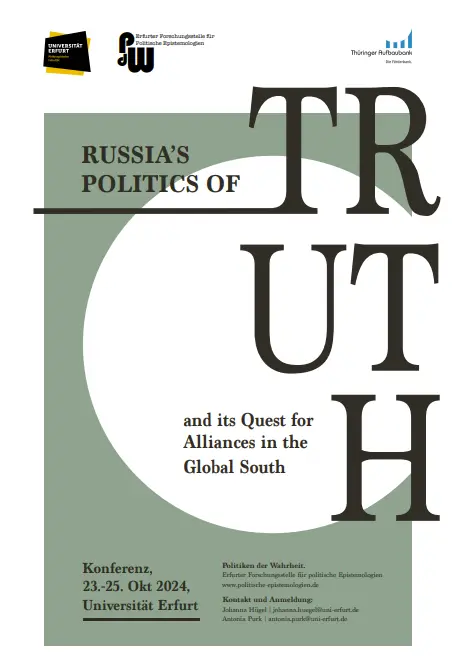This workshop aims at analysing how Russia stages itself as an anti-colonial protecting power. With the help of which terms and concepts, but also media and political techniques, is the Putin regime working to restructure the Russian and global past and present? How are new alliances and imagined communities created, especially with countries of the Global South? As an analytical lens we propose methodological approaches such as political epistemology and praxeology. Russia’s Politics of Truth and its quest for alliances in the Global South Since 2014, we have been able to observe Russia portraying itself increasingly not just as the only remaining power of the morally good and historically true. In relation to countries of the Global South, Russia has also especially presented itself as an anti-colonial protecting power. This framing is anchored within two broader narratives:
First, under the slogan of “historical truth”, Putin is pushing a specific historical policy, the central reference point of which is the victory of the Soviet Union over Nazi Germany in the so-called Great Patriotic War. This newly structured and enhanced past is turned into an ever-present prism – through iterative references by the state media, but especially events that allow a large portion of the population to directly participate in the commemoration of this past – by which the present can also be seen and interpreted (McGlynn 2023). At high-profile media events such as the Russia-Africa Summit, the Soviet Union's support of anti-colonial liberation movements has increasingly become part of these historical memory and updating practices, through which the claim of being on the "right side of history" is made. Second, another anchor point lies in so-called “traditional values”, which primarily conceal an ultra-conservative gender policy that is characterized by homophobia, anti-feminism and antiqueer sentiments. Depictions of Gender Order can function as ‘symbolic border guards’ that allow essentialization and demarcation between communities (Riabova/Riabov 2014). Against this backdrop, comparative perspectives can be fruitful for our analysis: For the Polish case it has already been analyzed how the ultra-conservative gender policy agenda has appropriated an anticolonial framing, with “gender” being depicted as “Ebola from Brussels” (Korolczuk/Graff 2018). The “traditional family” in this context becomes a signifier for self-determined, autochthonous, or even indigenous ways of life. This agenda is also being pushed and exported through the Russian Orthodox Church, not only within Russia but on a global scale, for example on the African continent. Russia’s full-scale invasion of Ukraine has sparked intensive discussion within the discipline of East European Studies about decolonizing the subject. In this context, the basic epistemological assumptions of the discipline have been called into question. In relation to present-day Russia, the concept of a Foucauldian regime of truth was suggested to examine the connections between institutional conditions and social systems of norms and values (see Vulpius 2021). This could not only help to analyze the consent to war in parts of Russian society, but also in parts of the Global South. The aim of the workshop is to analyze these Russian Politics of Truth (Kleeberg/Suter 2014) with a special focus on interconnections with the Global South.


